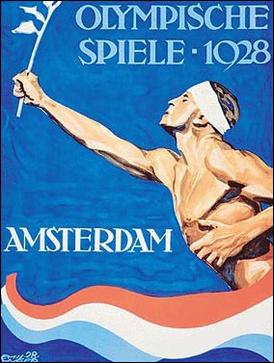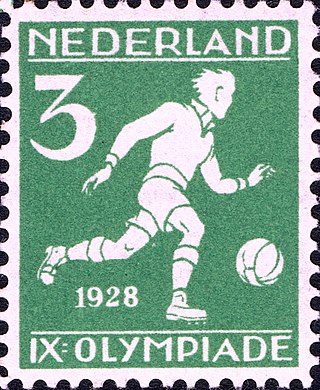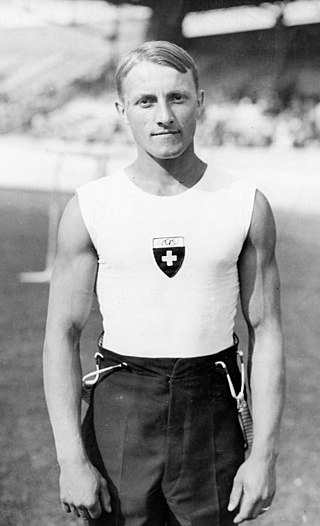
The 1928 Summer Olympics, officially known as the Games of the IX Olympiad and commonly known as Amsterdam 1928, was an international multi-sport event that was celebrated from 28 July to 12 August 1928 in Amsterdam, Netherlands. The city of Amsterdam had previously bid for the 1920 and 1924 Olympic Games, but was obliged to give way to war-torn Antwerp in Belgium for the 1920 Games and Pierre de Coubertin's Paris for the 1924 Games.

Great Britain, represented by the British Olympic Association (BOA), competed at the 2000 Summer Olympics in Sydney, Australia. British athletes have competed in every Summer Olympic Games. 310 competitors, 181 men and 129 women, took part in 179 events in 23 sports. These were the first Summer Olympics in which the team of selected athletes was officially known as Team GB in a highly successful attempt to unify all the competing athletes across all the sports and events and boost team morale. Going into the games following their exceptionally poor performance in Atlanta widespread expectations of the team were low.

Ukraine competed in the Summer Olympic Games as an independent nation for the first time at the 1996 Summer Olympics in Atlanta, United States. Previously, Ukrainian athletes competed for the Unified Team at the 1992 Summer Olympics. 231 competitors, 146 men and 85 women, took part in 148 events in 21 sports.

Gymnastics events have been contested at every Summer Olympic Games since the birth of the modern Olympic movement at the 1896 Summer Olympics in Athens. For 32 years, only men were allowed to compete. Beginning at the 1928 Summer Olympics in Amsterdam, women were allowed to compete in artistic gymnastics events as well. Rhythmic gymnastics events were introduced at the 1984 Summer Olympics in Los Angeles, and trampoline events were added at the 2000 Summer Olympics in Sydney.

The equestrian events at the 1928 Summer Olympics included dressage, eventing, and show jumping. All three disciplines had both individual and team competitions. The competitions were held from 8 to 12 August 1928. Teams were now fielded by three riders, rather than four, the purpose being to reduce pressure on national federations to find that many riders in order to compete for team medals. Riders had to be considered amateurs, which was defined as either an actively serving professional officer, or as a gentleman rider as defined by the rules of that rider's national governing body. A total of 113 entries were present from 20 nations: Argentina, Austria, Belgium, Bulgaria, Czechoslovakia, Denmark, Finland, France, Germany, Hungary, Italy, Japan, the Netherlands, Norway, Poland, Portugal, Spain, Sweden, Switzerland, and the USA. This was the first appearance for Hungary, Japan and Argentina in equestrian events at an Olympics. Additionally, after being shut out from two Olympic competitions, Germany also returned to the Games to win a few medals in the equestrian events.

At the 1928 Summer Olympics in Amsterdam, 27 athletics events were contested. The competition was held on a 400-meter track and would become the standard for athletics tracks in the future. For the first time, women's events in athletics were included in the Olympic Games program. There was a total of 706 participants from 40 countries competing.

France competed at the 1928 Summer Olympics in Amsterdam, Netherlands. 255 competitors, 219 men and 36 women, took part in 112 events in 17 sports. At the beginning of the games there was an incident where a French coach was physically assaulted by a Stadium gatekeeper who refused him entry. It boiled over to a point where the entire French team did not participate in the Parade of Nations, and conversations were made to pull out of the games completely. However, the issue was resolved and France went on to compete.

Football was one of the tournaments at the 1928 Summer Olympics. It was won by Uruguay against Argentina, and was the last Olympic football tournament before the inception of the FIFA World Cup, which was held for the first time in 1930.

The Netherlands was the host nation for the 1928 Summer Olympics in Amsterdam. 266 competitors, 222 men and 44 women, took part in 103 events in 17 sports.

Germany competed at the 1928 Summer Olympics in Amsterdam, Netherlands. Germany returned to the Olympic Games after not being invited to both the 1920 and 1924 Games. Despite a total absence of 16 years since 1912, German athletes were ranked 2nd. 295 competitors, 260 men and 35 women, took part in 95 events in 16 sports.
At the 1948 Summer Olympics in London, nine events in gymnastics were contested. Finland led all nations with six gold medals and ten medals overall.

At the 1928 Summer Olympics in Amsterdam, four diving events were contested. The men's plain high diving event was dropped from the Olympic program. The competitions were held from Monday, 6 August 1928 to Saturday, 11 August 1928.
The 1928 Summer Olympics Water Polo event was held between the fourth and eleventh of August. The final results of the tournament follow below.

Vlasta Děkanová was a Czechoslovak artistic gymnast. She was the first World all-around champion in women's artistic gymnastics.

The individual show jumping at the 1928 Summer Olympics took place on 12 August 1928 at the Olympic Stadium in Amsterdam. Scores from the individual competition were summed to give results in the team competition. There were 46 competitors from 16 nations. Each nation could send a team of three riders; 15 nations did so, while Japan had a single rider. The event was won by František Ventura of Czechoslovakia, the nation's first medal in individual jumping. France earned its first medal in the event since 1912 with Pierre Bertran de Balanda's silver. Charles-Gustave Kuhn took bronze, putting Switzerland on the podium for the second consecutive Games.

The men's rings event was part of the gymnastics programme at the 1928 Summer Olympics. It was one of seven gymnastics events for men and it was contested for the fourth time after 1896, 1904, and 1924. Scores from the rings event were added to the results from other individual apparatus events to give aggregate scores for the individual and team all-around events. Eighty-eight gymnasts from eleven nations competed, with each nation having a team of 8 gymnasts. The event was won by Leon Štukelj of Yugoslavia, the nation's first medal in the rings event. For the second consecutive Games, Czechoslovakian gymnasts took both silver and bronze: Ladislav Vácha finished second and Emanuel Löffler is credited with a third place finish. Vácha, the bronze medalist in 1924, was the first man to win multiple medals in the event.

The men's vault event was part of the gymnastics programme at the 1928 Summer Olympics held in Amsterdam. It was one of seven gymnastics events for men and it was contested for the fourth time after 1896, 1904, and 1924. Scores from the vault event were added to the results from other individual apparatus events to give aggregate scores for the individual and team all-around events. There were 85 competitors from 11 nations. Each nation had a team of 8 gymnasts; three of the 88 men did not start. The event was won by Eugen Mack of Switzerland, the nation's first victory in the event and first medal since 1896. Emanuel Löffler gave Czechoslovakia its second consecutive silver medal. Stane Derganc's bronze was Yugoslavia's first medal in the event.

The men's artistic individual all-around event was part of the gymnastics programme at the 1928 Summer Olympics. It was one of seven gymnastics events for men and was the seventh Olympic men's all-around gymnastic championship. Scores from the individual apparatus events were added to give aggregate scores for the individual all-around; individual all-around scores were similarly summed for the team all-around event. There were 88 competitors from 11 nations. Each nation sent a team of 8 gymnasts. The event was won by Georges Miez of Switzerland, with his countryman Hermann Hänggi taking silver. They were the first medals in the event for Swiss gymnasts since 1904 and the first gold medal ever for a Swiss man in the individual all-around. Defending Olympic champion Leon Štukelj of Yugoslavia finished with the bronze this time, making him the third man to win multiple medals in the event.
The women's team event was part of the gymnastics programme at the 1928 Summer Olympics. It was the first Olympic gymnastics event for women, and was the only gymnastics event for women that year. Women's gymnastics would become a permanent event in 1936. Total scores were determined by adding drill, apparatus, and vault components.
The 1928 United States Olympic trials for track and field were held between July 3 and July 7, 1928 and decided the United States team for the 1928 Summer Olympics in Amsterdam. For the first time, women's track and field was part of the Olympic program. The trials for men and women were held separately; men competed at Harvard Stadium in Cambridge, Massachusetts on July 6 and July 7, while women competed at City Field in Newark, New Jersey on July 4. Three of the men's events were contested in Philadelphia, Pennsylvania between July 3 and July 5.















